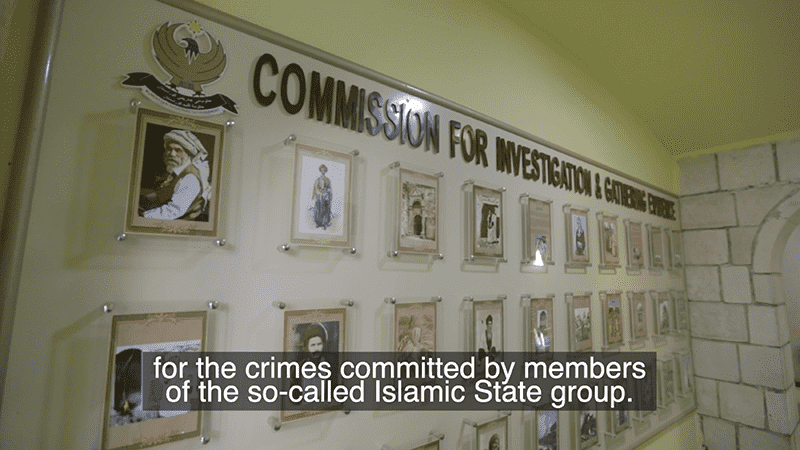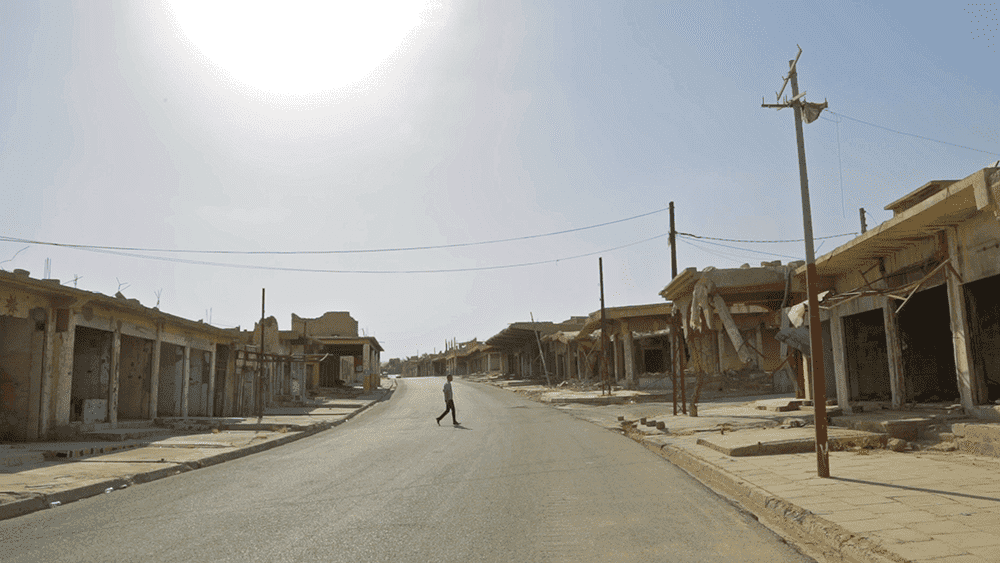DOCUMENTARY SPECIAL
In their own words: The Yazidi Genocide continues
NEW YAZIDI-LED DOCUMENTARY EMPHASIZES CALLS TO ACTION OF GENOCIDE SURVIVORS IN SINJAR
FOR IMMEDIATE RELEASE
Press release
SINJAR, September 19, 2022 – A new short documentary offers an intimate glimpse into the deep suffering of Yazidi genocide survivors fighting political inaction in Iraq and the Kurdistan Region. It is now available for public viewing, as part of a wider strategy to develop public advocacy assets for the Yazidi people.
Produced in the Arabic language with English subtitles, the documentary was filmed in Sinjar, which used to be home to 550,000 Yazidis before the genocide unleashed by Da’esh began on August 4, 2014.
Directed by Mohamad Chreyteh, the documentary was commissioned, funded, and co-produced by Lynn Zovighian and The Zovighian Partnership. Its goal is to amplify Yazidi voices to help re-engage global stakeholders at a time when diplomacy, solidarity, and funding are urgently needed. Yazda, a Yazidi community institution, worked closely with the producers to ensure the deep inclusion of Yazidis, in line with survivor ethical protocols.
On camera, Yazidis share their daily lived experiences eight years into the Yazidi Genocide. They explain what it feels like to live under constant threat of community extermination in a relentless collective fight for survival. Luqman, the Keeper of Lalish Temple, says on camera on the holy grounds of worship: “The Yazidi people, after
Da’esh entered their homeland, have lived a very difficult life… The Yazidi family today is broken.”
“This film was produced and realized with journalistic standards to convey the truth, reality of the pain, and outrages conditions that the Yazidis have been continuously subjected to in Iraq,” explains Chreyteh.
Iraq used to be home to more than 550,000 Yazidis. More than 360,000 Yazidis remain displaced eight years since Da’esh
launched their genocide campaign in Sinjar on August 3, 2014.

The mission of the Commission for Investigating and Gathering Evidence, established by the Kurdistan Regional Government, is to gather evidence investigate, and build cases for the crimes committed by Da’esh.
A call for justice
"I believe this documentary is a part of the justice process for the Yazidis, as it tells the world our plight in detail. It elaborates on what happened to us, why it happened, and what can be done about it,”explains Haider Elias, Co-founder & President of Yazda Organization. “Thank you for your efforts in making this film possible.”
Sinjar Academy Founder and Yazda Organization Co-founder and former Executive Director, Murad Ismael, comments: “This is a powerful documentary depicting the state of the Yazidi community eight years since the start of genocide. It put me in tears and probably will do the same to you. But we should not close our eyes on a people who collectively suffer. It is necessary to tell this story once again, because the world has moved on, while the Yazidis cannot.”
“It validates how important it is for Yazidi women and girls to be reunited with their families and for the West to help Yazidi families in IDP camps to relocate them back to their communities,” says former congressman and current Commissioner on the United States Committee for International Religious Freedom (USCIRF) Frank Wolf in a personal capacity.
To date, no justice mechanisms for Yazidi survivors have been implemented in Iraq, despite the passing of the Yazidi Survivors Law and recognition of the Yazidi Genocide in October 2021. Almost 2,760 Yazidis remain unaccounted for. An estimated 30 of the over 80 mass graves discovered have been exhumed to date.
“Politics is everywhere. It prevails over life in general,” says Senior Investigative Judge Ayman Mustapha on camera, confirming that the absence of a national plan to coordinate the trials for the crimes of genocide committed by
Da’esh
is obstructing justice.
Bafren, a Yazidi survivor of Da’esh sexual enslavement states on camera: “We will not hide the crimes of Da’esh. We will continue to say that these acts should never happen again.”
The changing face of Sinjar
The documentary was produced against a precarious security and political backdrop. Sinjar remains a very unstable region, not only because of its disputed status between the Government of Iraq and the Kurdistan Regional Government, but because it has been territorially demarcated amongst at least 11 armed groups. It has also become an intersectional hotspot for geopolitical players. Iranian influence is visibly growing, and the Turkish Air Force are relentlessly bombarding civilian areas under the pretense that the PKK is locally present.
“The reality is that Sinjar is today an increasingly dangerous place, not because of
Da’esh
cells, but because of militia activity and airstrikes,” shares Lynn Zovighian, Co-founder and Managing Director of The Zovighian Partnership. She explains how Sinjar is unsuitable for community and human life: “The production team strongly felt this insecurity while filming on the ground. But they have the privilege of entering and then leaving. What about historic Sinjari residents who just wish to exercise their human right to safely return back home?”
The policy of inaction is amplifying the genocide
With significant insecurity and political strife, there are still no plans to rebuild Sinjar safely and inclusively for all Sinjaris. Camera frames show the complete destruction of areas like Downtown Sinjar City, reduced to a ghost town out of a movie. With no political will to alter course, Yazidis and other minority communities are unable to return to Sinjar and its many historic villages and towns. Over 200,000 Yazidis remain in internally displaced persons (IDP) camps with fears that they may become permanent settlements. The lack of consistent public reporting on displacement and re-displacement is a growing challenge for the community and policy makers. However, what is clear, is the demographic reconfiguration of Sinjar, which used to be home to over 550,000 Yazidis, is becoming systematized.
“The government has not been able to provide security and stability for the Yazidi people. Therefore, I will remain armed to protect the Yazidi identity and the Yazidi people and the territory,” declares Khal Ali, Lalish Brigade Commander on camera.
Self-determination as a methodology of choice
“The track record of Sinjar teaches us how not to serve minority communities,” criticizes Zovighian. “We need a new methodological governance approach for protecting Sinjaris and enabling them to thrive as respected and productive Iraqi citizens. This demands self-determination.” The Yazidis and minority communities continue to be intentionally excluded from political decision-making on the future of Sinjar. The signing of the Sinjar Agreement in 2021 with no involvement of local historic communities has proven to be a significant political failure.
A Yazda Yazidi Survivors Network (YSN) member explains: “I want to be able to speak for myself and not have others speak for me.” Self-determination and lack thereof will be increasingly more measurable, as the risks of non-inclusion become more striking.
Another YSN member elaborates: “We want to participate in every decision that affects us as survivors. We want to be our own voice in all projects that concern us because only we know what we have been through and what we need in order to achieve the peace and security we desire, as well as to recover from our sufferings.”
Human Rights Lawyer Sherizaan Minwalla, highlights, “The goal when elevating the voices of survivors is to empower them to tell their stories on their own terms and if and when they are ready.”
The short documentary was strategically conceptualized with a community-centered, high participatory research design to investigate the long-term consequences of crimes of genocide facing Yazidis and hear their calls for action. With a length of 9:01 minutes, the documentary features five Yazidi genocide survivors and one Iraqi senior judge. The co-producers insisted that more than 90% of audio time be dedicated to elevating diverse Yazidi voices.
Elias highlights the importance of this methodology and calls for its use on the diplomatic stage, stating: “What we need is direct testimonies from the survivors and stories taken directly from the community members exactly as it is put together in this documentary.”
A contribution to original Arabic content
The production decision to feature the short documentary in Arabic is both strategic and symbolic. Zovighian explains: “It was important to feature the documentary in a language that most Yazidis from Iraq and Syria can understand. Arabic is also the official language in diplomacy in the Middle East, and it is high time that regional governments play an overdue role in supporting minority communities deeply damaged by crimes of genocide and crimes against humanity perpetrated by Da’esh. English subtitles accompany to ensure a global reach and invite global friends of the Yazidi Cause to watch and learn.”
In the Middle East, there is a growing call amongst scholars and activists to invest in Arabic language content development to strengthen ownership of challenges and opportunities. The co-producers were especially sensitive to funding a production that would contribute to direct and indirect colonization of intangible cultural and community assets.
Chreyteh explains, “The film presents a protest against the absence of significant actions that would put an end to an open wound in the body of humanity.”
For survivors, more international advocacy is needed
Survivors do not feel enough attention and investments are going into advocacy for the Yazidi Cause. Responding to the premiere of the documentary, survivors offered feedback and guidance for further investments in advocacy assets and efforts.
“Survivors are ready to see justice, they have been ready for eight years now, so what are we waiting for? A clear consequence of our inaction will be to silence all their voices and to only be ready for action once it is too late,” says Natia Navrouzov, Legal Advocacy Director at Yazda Organization, at the Eighth Annual Commemoration of the Yazidi Genocide. “That sends a dangerous message: that survivor voices and their suffering do not matter,” she concluded.
According to YSN member and human rights activist Khawla Ismail: “It made me sad to see our life as a documentary documenting genocide.” She adds, “It covered some of our life situations, but it was a small part. Therefore, thousands of things are not covered, and people don’t know about them.”
Shereen Khero, another YSN member, explains that there is a need for more documentaries to help onboard stakeholders who are less familiar with the Yazidi Cause. Yazidi human rights activist and YSN member, Sarab Naif agrees: “There is still a lot to be documented and seen so that people know who we are and what happened to us.”
Ismail adds: “It is essential to invest in public advocacy because we need to deliver our message since nothing has changed, and no one has been given their rights.” She continues, “We still believe that national and international stakeholders will respond in a better way so that our people can get their rights.”
“If we as survivors continue to advocate for our case and people, other people and countries will eventually do something and make a change,” concludes Naif.
For Arabic
click here.
Watch documentary
here.
The Zovighian Partnership is a family-owned social investment platform, established by father and daughter in 2013. Deeply invested in R&D, we are committed to delivering ethical, inclusive, and innovative design, research, and prototypes.
The Zovighian Partnership
Public Office
is committed to delivering significant resources to bringing grounded methodology, sound governance, and rigorous strategic thinking to communities and cities in crisis. We hold ourselves accountable to giving voice to the diversity of views that are central to long-term and sustainable peace and socio-economic enablement.


